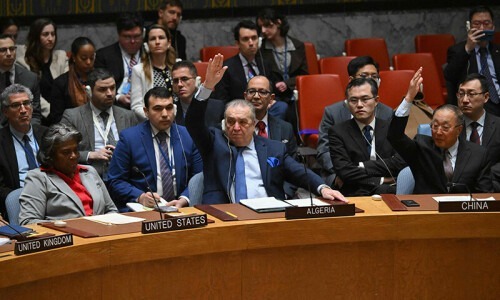- The ceasefire resolution demands the immediate extension of assistance delivery and the release of prisoners.
- Russia is upset about the word “permanent” being replaced with less strong language.
- Guterres cautions that failing to follow the resolution “would be unforgivable.”
- Washington abstains, so a veto is avoided.
UNITED NATIONS: On Monday, the UN Security Council at last endorsed a resolution calling for an acceleration of relief into the beleaguered Palestinian enclave, an unconditional release of prisoners, and an immediate truce in Gaza throughout Ramadan.
UN Secretary General António Guterres quickly responded to the vote by highlighting how the long-awaited resolution had to be put into effect because the council’s inaction on it “would be unforgivable.”
The council’s last-minute deliberations allowed for the successful avoidance of a second possible veto.
Due to the US’s abstention and failure to exercise its veto, the draft resolution was approved.
Unfortunately, not enough votes were cast for a Russian amendment to pass. In the substantive vote, the resolution received 14 votes in favor.
US Ambassador Linda Thomas-Greenfield emphasized that the Security Council’s adoption of the resolution showed support for the ongoing diplomatic efforts of Egypt, Qatar, and Washington to secure the release of all prisoners, bring about an immediate and durable ceasefire, and lessen the suffering of Palestinian civilians in Gaza.
She declared, “The United States fully supports these critical objectives.” “The resolution we submitted last week, which Russia and China blocked, was based on these objectives.”
According to Thomas-Greenfield, the United States was “engaged in diplomatic efforts to realise them on the ground” nonstop. She accused Hamas of impeding peace talks and urged the council members to acknowledge that a truce might have been reached “months ago” had the organization been prepared to release the captives.
She continued, “I therefore implore the members of this council to demand without reservation that Hamas accept the deal on the table.”
The only Arab member of the council, Algeria, expressed the hope that the five-month-long atrocities would come to a stop with the proposal.
Algeria’s ambassador, Amar Benjama, stated, “Finally, the Security Council is responding to the calls of the international community and the [UN] secretary general.”
A Note to the Palestinians
He said that the proposal sends the Palestinian people a very clear message: “The international community, in its entirety, did not abandon you.”
“To realize the goal of the Palestinian people…to put an end to the bloodshed without any conditions,” he declared, this was the beginning.”
Ambassador Yamazaki led a minute of silence to honor the victims of the terrorist attack that occurred in Moscow on Friday before the meeting got underway.
Speaking on behalf of the ten elected council members, Mozambique’s Ambassador Pero Afonso introduced the text, emphasizing the urgent need to address the catastrophic situation in the Gaza Strip.
He emphasized that the main driving force behind the proposed text was the council’s authority under the UN Charter to pursue these goals.
Vassily Nebenzia, the Russian ambassador, strongly objected to the word “permanent” being replaced in the operative paragraph with less precise wording, calling it “unacceptable.” He emphasized that the word “permanent” was expressly included in their voting instructions, and that any change may be seen as implicit support for Israel to continue its attacks.
As a result, the delegation from Namibia made an oral amendment to the draft resolution to add the word “permanent.”
Since the dispute started in October, multiple draft resolutions have been rejected due to enduring differences within the 15-member council, especially those involving the five permanent veto holders. China, France, Russia, the United Kingdom, and the United States have the right to veto.
Brief resolution
With just four main phrases, the resolution presented to the council on Monday was brief. In order to create a long-lasting, sustainable truce, it demanded “an immediate ceasefire for the month of Ramadan respected by all parties.”
It also demanded that “the parties comply with their obligations under international law in relation to all persons they detain” and “the immediate and unconditional release of all hostages, as well as ensuring humanitarian access to address their medical and other humanitarian needs.”
“The urgent need to expand the flow of humanitarian assistance to and reinforce the protection of civilians in the entire Gaza Strip” was underscored by additional measures.
The document restated earlier UNSC resolutions and the council’s demand for “the lifting of all barriers to the provision of humanitarian assistance at scale, in line with international humanitarian law.”
As the meeting got underway, strange things started happening in the council chamber. The Russian envoy held lengthy talks with a number of distinguished officials, including as the ambassador for Malta and the Palestinian Observer, in an attempt to avert a possible veto before the document was submitted for voting.
Before formally calling the Security Council to order in March, Ambassador Yamazaki, who was in charge of the group, observed calmly while participants engaged in lively talks.








